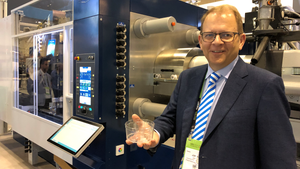Tungsten carbide: Will it pass as the ultimate screw material?
May 1, 1997
Spirex is looking for molders running highly abrasive materials who want to put its new tungsten carbide screw to the test. Are you interested?
Just how much more are molders of abrasive materials willing to pay for long-lasting screws? Inthe never-ending quest to build an everlasting screw, Spirex has developed a new screw made almost entirely of tungsten carbide - the de facto metal standard for hardness and wear. Now the company needs help from molders to prove the screw's abilities.
The diamond-ground screw uses at least 90 percent tungsten carbide, with either a cobalt or nickel binding agent. Spirex president Paul Colby points out that until now, tungsten carbide was used mostly as an alloying element in barrel linings, but in relatively small amounts - usually 20 to 30 percent. With the leap to an almost pure tungsten carbide recipe, Spirex (Youngstown, OH) is sailing into uncharted waters. A few questions remain unanswered.
The first is brittleness. A compound as hard as tungsten carbide is also less forgiving of the rapid loads from torque introduced by an injection molding machine. "The brittleness is, of course, a consideration," says Colby. "But we don't know where we stand with that." Colby says Spirex has spent several weeks testing the screw on a 120-ton Toshiba, molding ABS parts. He says he has not encountered problems with brittleness yet, but wants to get the screw into a real production environment to yield practical data. "We're worried about torque, but we haven't broken the screw yet," he says.
The finish on the screw, provided by the diamond cutting, is already better than standards established by SPI, Colby says. The diameter of the screw is size-limited. Colby says the screw is currently available in sizes up to 70 mm. "Much beyond that will cost a fortune," he says.
In diameters below 70 mm, Colby says a 50-mm screw will probably cost about four to five times as much as a 50-mm 4140 steel screw. Consider, however, the benefits a long-wear screw can bring to your shop. Conservative calculations at Spirex estimate that the tungsten carbide screw could last 10 times longer than a CPM screw, if not more. "It's a whole new magnitude," says Colby.
So Spirex is now searching for a molder or two. Wanted: an injection molder of highly filled abrasive material willing to try new tungsten carbide screw; must be willing to gather and share data; machine must be able to ramp up slowly to avoid screw torque shock.
One candidate may be Plastic Components Inc., a small-parts molder in Germantown, WI. General manager and vice president Dwayne Pliner runs 33 percent glass-filled, 40 percent mineral-filled, and a 40 percent mineral-glass-filled nylon. He says some of his screws are dying on him in less than a year. He says he's ready to try something new. "If someone wants to send a tungsten carbide screw my way, I'll throw it in my press and we'll see what it can do," he says.
Pliner also uses several Inductametals Ultramax tungsten- carbide-lined barrels. "The only question I have," he says, "is how a tungsten carbide screw holds up in a tungsten carbide barrel." Ted Krengel, president of Inductametals, says that would be his concern as well. He notes a tendency of some materials to catch or bind to themselves. "If it's solid carbide, what happens when you go against carbide barrels?" he asks. Colby says he doesn't expect that a carbide screw on a carbide barrel will produce galling, but possibly particle-on-particle sticking. (Colby reports that his supplier knows of successful carbide-on-carbide production applications.) Again, he says he won't know until he gets volunteers willing to help test the screw.
If you're a molder willing to try the tungsten carbide screw, Spirex will offer it for a reduced price if you're also willing to cooperate on testing and share performance data. Call Paul Colby at Spirex if you're interested: (330) 726-4000.
You May Also Like


